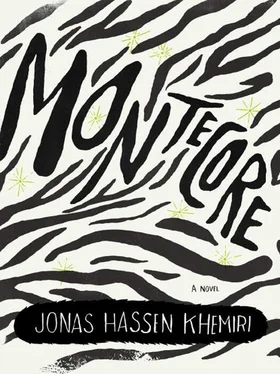Here your father began to spread active irritation about your constant talk of wordish rules. He said to you:
“Twist your focus to your homework instead! Go out and play soccer! Be a bit normal! I wanted to formulate these rules with a gleamed eye, not with the passion that you seem to show. I do not want to see hide nor hair of you here!”
And do you know what bizarre you respondered? You sat with the yellow pencil chewed between your lips, pondered, and then pronounced:
“Even this can be salvaged as a rule of grammar! ‘Hide nor hair’ is like ‘scarcer than hens’ teeth.’ And who cares about hair more than Swedes? The contours of truth are near now!”
Your father side-swung his sighing head. On the next page is the tenth and terminating rule:
MNEMONIC RULE 10
The Swedes are also the Hair People. Hairstyles bear a great weight in Sweden; the work of hairstylists exposes a well-formed status and also this can of course be noticed in the Swedes’ linguistic use. Absent is when one has not seen “hide nor hair,” of something, a neat person does not have “a hair out of place,” something subtle is as “fine as a hair,” something uncertain “hangs by a hair,” something that makes one tough “puts hair on one’s chest,” finding subtleties is “splitting hairs,” to be anxious is to “pull your hair out,” and to inspect carefully is to use “a fine-tooth comb.” Do not touch a “hair” on my friend’s head and do not give yourself “gray hair” in your attempt to “let your hair down” and a “hair-raising splitting of hairs does not make a hair’s breadth.”
These were our ten rules. We can conclude the section with your father’s recurring praise of the poetic excellence of Swedish (this is actually not in our notebook). Do you remember it? He would say something like this:
Let us now ring out our cry: Swedish is the language of loans, melody, the dairy, nature, animals, fine as hair! And of optimism! Swedish is the language where the narrow end of the alley is not a “dead end” (like in English) or the “rump of the bag” (like in French). In Sweden, the reuse, the compromise, and the side step are a perpetual alternative. In Swedish, this street is called … “the alley of returning …”
In actuality, our book is terminated by a page where someone has written with angry black letters:
BUT ALSO THE LANGUAGE OF ARAB-HATING: FOR WHAT OTHER LANGUAGE HAS EXPRESSIONS LIKE PYRAMID SCHEME!
This phrase is, however, carefully crossed out by your father.
In April of 1987 I chose to return home to Tunisia. My breast had shrunk my belief in your father’s economic talent and grown my longing for Tabarka’s touristettes, the daily life of Hôtel Majestique, and my nightly poker partners.
My emotion for your family’s status had also begun to distress me. Your father’s dirty shoes and holey beret, your mother’s tired nurse exterior, your constant economy-size packages from the cheap stores in Skärholmen, your magnet-attached three-crown rebate coupons on the refrigerator, your TV with a taped antenna cord, your little brothers’ hand-me-down rompers, your room with your father’s home-constructed bookshelves. Everything filled me with the tragedy of aversion. For certainly it was not this your father projected when he left Tunisia?
Your father closed the studio and escorted me to Central Station for me to say farewell. Before the departure he delegated me a certain reduced salary plus our joint linguistic-rule notebook:
“Here, a souvenir. You may as well take it so that my son escapes confusing himself even more in the fog of his imagination.”
I accepted the book. And then pronounced a phrase that I would probably regret and draw back into my mouth with the same suck as in the Vicks cough drop ads of the time. If I only could.
“Thanks, Abbas. Good luck for the future. I hope you succeed in your ambition of not infecting your son with being an outsider.”
“What do you mean, infect?”
“Well, certainly it seems being an outsider wanders in inheritance from one generation to the next? And simultaneously infects those who are near? A little like a contagious disease?”
This was a thought I had polished in my solitude and I felt proud about, for once, being able to sprinkle your father with a new insight. Your father nodded his head.
“That is the most intelligent thing I have heard you say for a long time, Kadir. Being an outsider as an infection. I will memorize that. And if you ever come across an idea of how I should grow my studio’s success, then contact me … I guarantee to pay my borrowed sum with added interest as soon as it is possible.”
We waved our farewell. This picture, of your unshaven father who grimly waves me through the glass on the airport bus, is to me a strong memory. This was the last time I saw your father and automatically recognized him.
Dearest greetings!
Naturally I am gladdened by your athletic ambition. But I am darkened when I do not understand your insinuations. You write: “Isn’t it true that you and Dad had a huge beef before you parted? That you had a big fight with yelling and scuffling and uproar?” What kind of knickknack is this? Is it your mother who has said this? Is a “beef” equivalent to a fight?
I will unmask something: Your mother may be a woman unique from the generality of ALL other women. BUT her interest in your father’s friends was never bigger than that of a puddle. She constantly mixed their names, and when your father named them Aristocats your mother soon began to name them the Aristoidiots. She was irritated by their drinking habits and would probably rather see your father’s relations with her secure communist circle. This is my truth and you can verify it with your mother.
That you do not remember my friendly farewell or all our linguistic rules surely doesn’t mean that they have not existed? I have the proof before me this very second. Write me, by the way … What do you remember of the moon landing or the Olympics in Mexico or the summer of ’74? Not much, right? Do not let the precariousness of memory swirl our focus.
On the other hand, you are possibly correct that the rules would uptake too many pages in our book. In order to shape a global master opus the alternative that these linguistic rules are injected ONLY in the Swedish version is presented. In the French version we can let your father applaud the Eiffel Tower, Jacques Brel, and nuclear tests in the territory of others, enjoying a Brie-filled baguette. The Australian version can fantasize forth a customer who invades the studio and tells of his time as a kangaroo hunter. In the South American version an Indian can play a melody on a pan flute. Indian readers can be served your father’s recipe for curry; to yellower Asians we can introduce a passage where your father expresses himself positively about small, cute stuffed animals, video games, raw fish, sumo wrestling, industrious men, and obedient women. What do you think?
Now we will initiate the book’s quadratic section, and once again it is time for you to invade the story. You must be rather hungry for revenge after your latest defeat. Naturally you will get a new chance; no one is infallible, not even Dr. Phil. (Except maybe in his master opus Defining Your Authentic Self .) Let us now show how your father succeeded in rousing his studio to a success story. Let us simultaneously hope that you have grown your talent since last time. I affix you an adequate introduction with added headings in order to guide the book in the correct angle.
Your biding friend,
Kadir
PS: The global world net just informed me that Jean-Marc Bouju has received the World Press Photo of the Year! Can you keep a very secret secrecy? Jean-Marc Bouju is one of your father’s anonymous aliases! Your father shot the photograph in question in March 2003 in an American prison camp near the Iraqi Najaf. Have you seen the photo? It is painfully arresting. An Iraqi prisoner sits with bent back on the ground, draped in a white coverall behind curled thorny wire. His head is confined in a black plastic hood. In his embrace he has his crying son. The anonymous man is enclosing his son, resting his hand on his forehead; the plastic hood is gleaming in the sunshine. The photo constantly moves me to tears. And now as I am writing you these phrases the tears are coming back. Just the thought of the father and the son makes everything blurry, the keys, the letters, the computer screen. I miss your father so terribly much. I hope and pray that he soon will return from where he is now. But perhaps it is too late.
Читать дальше










